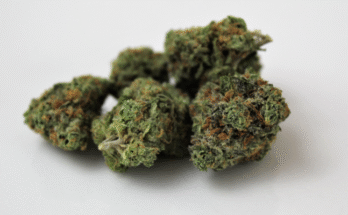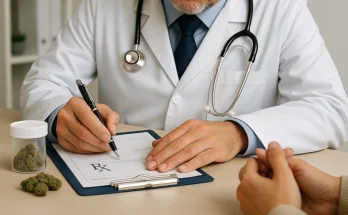Cannabis is one of nature’s most powerful healers.
But let’s be honest, if you’ve ever overdone it with THC, you know it can quickly flip from overjoyed to overwhelming. That “too high” feeling can sneak up on you, even when you’re trying to be careful.
Whether you’re using cannabis medicinally or recreationally, our goal is to help you feel better, not panicked.
We believe in using this plant with respect, intention, and knowledge.
In this post, we’ll walk you through how to avoid getting too high, how to come back down if it happens, and how to develop a better relationship with THC that supports, not sabotages, your well-being.
First of all, why does THC make you feel too high?
Let’s start with the basics.
THC (tetrahydrocannabinol) is the main psychoactive compound in cannabis. It binds to cannabinoid receptors in your brain and body, affecting mood, memory, coordination, and perception.
In moderate amounts, this can feel relaxing, euphoric, or creative. In excess, it can tip into anxiety, paranoia, dizziness, or a full-on freak-out.
This sensitivity varies by person and is influenced by factors like:
- Your endocannabinoid system (how well it’s functioning)
- Your metabolism
- Your tolerance
- Your mindset and environment
- How you consumed the THC (smoking, edibles, oils, etc.)
Our approach is to understand this process without fear or judgment. Feeling too high doesn’t mean cannabis is “bad”, it just means your body needs a different dose, format, or approach.

The problem with “more is better”
A lot of the modern cannabis scene is focused on pushing limits – super potent strains, sky-high edibles, concentrates with THC levels over 90%.
But just because you can doesn’t mean you should.
Rather, in order to get the most benefits from cannabis, we promote intentional, metabolic-friendly cannabis use. That means using it to support healing, not to escape or overload the body.
In fact, one of the biggest drivers of that uncomfortable “too high” state is THC overload without enough metabolic resilience to process it.
Your mitochondria, those little powerhouses inside your cells, play a huge role in how your body handles cannabis.
If your energy systems are sluggish (due to poor sleep, stress, bad diet, toxin exposure), THC can hit you way harder.
If your body’s out of whack, cannabis will amplify that imbalance. But when your better regulated, cannabis can be a powerful tool.
Tips to avoid getting too high from THC
1. Start low and go slow
Yes, it’s cliché. But it’s cliché because it works.
Especially if you’re using edibles, tinctures, or oils, which metabolise differently than smoking or vaping.
We recommend:
- Edibles: Start with 1–2.5mg of THC, especially if you’re new.
- Tinctures/Oils: Begin with a microdose – just a drop or two.
- Vaping (dry herb preferred): Take one puff and wait 15 minutes.
You can always take more. You can’t untake what you’ve already consumed.
2. Balance THC with CBD
CBD (cannabidiol) is THC’s calming cousin. It’s non-psychoactive, and it actually helps counteract the effects of THC. Think of it as a buffer or anchor.
If you’re prone to anxiety or racing thoughts, opt for a balanced product (1:1 THC:CBD) or CBD-dominant strains. These offer the therapeutic benefits of cannabis without launching you into orbit.
3. Avoid high-THC concentrates
Unless you have a specific therapeutic reason and you know what you’re doing, we suggest skipping the 90%+ THC dabs.
They’re overwhelming for most people and often reduce the therapeutic value of cannabis. Instead, focus on whole plant products and moderate THC levels.
4. Choose dry herb vaping over smoking
Smoking combusts plant material and introduces toxins into your lungs – not ideal for health. We strongly recommend dry herb vaporisers, which gently heat the flower without burning it. This offers better control, fewer toxins, and a cleaner high.
Learn how to use a dry herb vape here.
5. Time it right
Cannabis interacts with your circadian rhythm and cortisol levels. Using THC late at night might disrupt your sleep architecture, while using it mid-day might trigger fatigue or anxiety.
Experiment with timing:
- Early evening often works best for relaxation and sleep support.
- Avoid using THC on an empty stomach or during high-stress moments.
- Sync your cannabis use with your lifestyle goals, not just habits.
6. Check your set and setting
Your mindset and environment massively affect your experience.
- Set: How are you feeling? Stressed? Anxious? Excited?
- Setting: Are you in a safe space? Are you comfortable? Alone or with friends?
If you’re already overwhelmed, THC can make that worse. Always take cannabis in a safe, familiar environment, especially when trying a new product.
What to do if you’re already too high

We’ve all been there. Here’s what to do if things get intense:
1. Breathe and hydrate
Deep, slow breaths help calm the nervous system. Sip water (or herbal tea) and remind yourself: This will pass.
2. Take CBD
If you have a CBD tincture or capsule on hand, take it. It may help tone down the THC effects and bring you back to baseline.
3. Chew on black peppercorns
This one sounds weird but works for many. Black pepper contains beta-caryophyllene, a terpene that may help reduce THC-induced anxiety. Chew on a few whole peppercorns or sniff some fresh black pepper.
4. Eat something fatty
THC is fat-soluble, meaning it binds to fats. Eating a small, healthy snack (like nut butter or avocado) might help your body metabolise the THC more steadily.
5. Distract yourself
Watch a comforting show, listen to calm music, or go for a short walk if safe. Move the energy through your body.
6. Lie down in a dark room
If all else fails, lie down, close your eyes, and breathe. Remind yourself that your body is just processing the THC and it will end soon. You are safe.
Long-term strategies for better THC experiences
We’re not just about damage control. Our goal is to help you use cannabis in a way that complements your health journey, not undermines it.
Here are some long-term strategies to help you avoid negative experiences:
– Build a metabolic foundation
The stronger your metabolic health, the better you’ll respond to cannabis. Focus on:
- Whole foods rich in nutrients and fibre
- Daily movement and strength training
- Consistent sleep-wake cycles
- Sunlight exposure
- Minimising environmental toxins
- Managing stress through breathwork, movement, or adaptogens
These pillars don’t just make cannabis safer, they make it more effective as a medicine.
– Track your responses
Keep a simple journal:
- What product did you take?
- How much?
- When?
- How did you feel 30 mins later? 1 hour? 2 hours?
Patterns will emerge. And when they do, you’ll learn how to personalise your use instead of guessing every time.

– Experiment with microdosing
You don’t need to get stoned to benefit from THC. Microdosing (0.5–2.5mg THC) can support:
- Mood
- Creativity
- Pain relief
- Sleep quality
- Inflammation
And it often avoids the intense psychoactive effects altogether.
Final Thoughts: You’re In Control
Cannabis is a powerful tool. But like all tools, it needs skill, understanding, and respect.
Feeling “too high” doesn’t make you weak, irresponsible, or broken. It just means you’re still learning your personal sweet spot.
We’re here to remind you: You are in control. You are your own best healer.
Ready to take control of your health naturally? Our newsletter is a great place to start. Join 17,000 other canna-curious readers for:
✅ Quick summaries of the week’s top cannabis news
✅ Updates on UK law, CBD flower, and novel cannabinoids
✅ Tips for safer use (dry herb vaping, oils, edibles)
✅ Honest product reviews and exclusive discounts
✅ A peek into the future of weed in the UK




